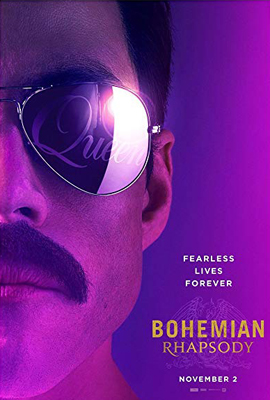 “Bohemian Rhapsody” skims the surface but never sinks its teeth into the rise and fall of ‘70s rock group Queen, leaving a mediocre, melodramatic, by-the-books musical biopic.
“Bohemian Rhapsody” skims the surface but never sinks its teeth into the rise and fall of ‘70s rock group Queen, leaving a mediocre, melodramatic, by-the-books musical biopic.
Spanning 15 years, from the group’s formation in 1970 to their final 1985 concert performance at Live Aid, “Bohemian’s” initial scenes play out like bullet points of an outline: Freddie Mercury meets guitarist Brian May and drummer Roger Taylor at London club gig to form band; Mercury names band Queen and convinces May and Taylor to record album with all their savings; agent sees band at session and signs them. This whirlwind success feels faster because “Bohemian” rushes through these familiar start-up scenes without getting involved in back stories for Mercury’s band mates- its focus is on Mercury and his personal fall that marked the end of the popular rock group.
As Queen’s flamboyant front man, Rami Malek (TV’s “Mr. Robot”) plays Freddie Mercury and his performance really pops when he’s performing as Mercury: Malek looks every bit the part strutting onstage. However, “Bohemian” doesn’t have a lot of live performance pieces, leaving Malek a lot of time to look forlorn and wounded in Mercury’s eventual isolation through his sexual orientation. The movie treats Mercury’s awakening as a bisexual in the most homogenized of ways, which makes sense for a PG-13 movie, but feels anti-climactic for the pain Malek evokes. The script lends little support for Malek, surprising considering it was written by Anthony McCarten (“The Theory of Everything”) and Peter Morgan (“Frost/Nixon”) as you’d expect these moments to have more weight and gravity. What you get instead are shots of Mercury hanging out near truck stop bathrooms while on tour or scenes with hokey repartee like Mercury telling another man “he likes him” countered with the man telling Mercury “call me when you like yourself.” It’s tough watching Malek do his best to put emotion into scenes that have an underwhelming impact.
There is an aspect of “Bohemian” I wished received more attention. When Queen describes their band as “four misfits who play for the misfits in the crowd” and compose “We Will Rock You” as a song to connect them to their concert audiences, I got behind the film’s depiction of a rock band wanting to unite with their fans- it’s probably the biggest reason Queen still maintains their popularity. This idea is most evident when the film recreates the band’s 1985 performance at Live Aid: it’s the film’s highlight and shows the audience’s affection for a band that hadn’t performed for years while serving as a poignant swan song for Mercury, who we learn in the film has contacted AIDS and sees Live Aid as his last hurrah.
While it doesn’t offer more than benign nostalgia, “Bohemian Rhapsody” reminds us of why Queen’s music still resonates- it entertained while staying original and embraced its fans like family.
